MPD's 121% increase in violent crime arrests
DC's experiment in increased enforcement continues to lower crime
The Metropolitan Police Department (MPD) announced a stunning increase in arrests for gun and violent crime offenses in January and February (the most recently released data):
Arrests for gun possession rose 54% from last year to a recent record high of 446
Arrests for violent crimes rose an astounding 121% to a recent record high of 416
This massive increase in arrests corresponds with falling crime through the first three months of 2024. This post will cover how DC’s increase in enforcement is playing out and how it scrambles some of the popular narratives about crime in DC:
This increase in arrests to record-high levels happened without an increase in police staffing or the repeal of police reform provisions that have been blamed for a decrease in proactive policing. These increased arrest rates happened before the passage of the Secure DC legislation and seem to be primarily driven by operational improvements within MPD.
Adult prosecutions by the United States Attorney’s Office (USAO) have increased significantly; though are still below their historic levels. From January-May 2023 the USAO averaged just 486 new cases per month. In February 2024 (the most recent data) they charged 774 new cases; a 59% increase. This increase seems to be primarily driven by increased public, media and Congressional pressure on the USAO and not legislation.
The increase in arrests and prosecutions has increased the detainee census at the DC jail from a record low of 1,219 in March 2023 to now 1,846 at the beginning of April 2024. This is an increase of 627 people or 51%. Again, most of this increase in detention is due to the increased flow of arrests and prosecutions; though the Summer crime bill did have a small impact on pretrial detention.
In short, the increased enforcement trends from the second half of 2023 that I covered in the post “Bouncing back from rock bottom” have continued into the first 3 months of 2024 and seem to have helped drive down crime even more. The proposed causal mechanisms here are that the increase in arrests and prosecutions have increased the certainty of punishment and helped deter crime while the increase in incarceration has incapacitated some criminals from committing more crimes:
The decrease in crime is more than just an improvement from last year’s awful Spring-Summer. From 2010-2020 DC averaged 315 reported violent crimes in March. This March we had 226 reported violent crimes, a 28% decrease.
The key outlier is homicides. While homicides are down 28% YTD and March’s 7 homicides was below the 2010-2020 average of 9 per month; the first days of April have been terrible with 6 homicides already. There is still work to do to deter and incapacitate the small population of people who drive the bulk of DC’s gun violence.
Starting with the crime trends, the sharp rise and fall of violent crime in DC is striking. After skyrocketing in Spring-Summer 2023, robberies have fallen far below the pre-COVID average and Assaults with a Dangerous Weapon (ADW) are at record lows. The exceptionally steep drop in violent crime does correspond with MPD’s surge of violent crime arrests:
The property crime trends aren’t as favorable but are still an improvement from last year’s spike. Motor vehicle theft still remains above the pre-COVID average while theft from auto is lower. Generic “theft/other” is a bit below pre-COVID trends but higher than the record-low levels of 2022-2022. Collectively property crime is down 12% YTD:
This data strongly suggests that the efforts to increase enforcement have helped bring down crime. We’ve seen massive, unprecedented increases (from record lows) in arrests, prosecutions and detention that correlate with large decreases in crime. And enforcement efforts have been focused on violent crime which has seen the largest decreases. Hopefully this data helps solidify the consensus that the operational realities of enforcement matter and do a much better job of explaining changes in crime than DC’s long-dominant “Vibes-Based Theory of Crime”:
It’s worth reviewing some of the reasons that MPD was able to produce such a large increase in arrests for violent crimes (+121%) and gun possession (+54%). It was certainly not due to an increase in staffing. MPD had 3,287 non-recruit sworn officers in February 2023 and just 3,194 a year later; a 3% decrease. Instead MPD, under Chief Smith’s leadership, seems to be more effective and proactive in making arrests. One MPD officer described the change in tone from MPD management (“white shirts”) as “So now, instead of white shirts telling people to only answer the radio, they are saying if you see something, do something.” Here are some recent examples of MPD officers proactively making arrests:
Officers noticed a car with no front license plate on U Street at 1:50AM and made a traffic stop. While talking with the driver they noticed a gun on the floorboard, searched the car, found another gun and ended up making 2 arrests (both of which were charged by the USAO).
An officer stopped a car that was driving on the shoulder (and had $1,850 in unpaid tickets) after a brief pursuit. Upon searching the vehicle the officer found and illegal shotgun & discovered that the driver had a warrant for Assault with a Dangerous weapon.
A Department of Public Works (DPW) License Plate Reader (LPR) detected a stolen car and the information was relayed to MPD. An officer found the car, stopped it and found an illegal gun on the driver, resulting in an arrest for Carrying a Pistol Without a License (CPWL).
A MPD Investigator was monitoring a suspect’s live feed on Instagram and noticed he was holding two handguns. In under an hour MPD had identified the location, gotten approval and organized a response to the site. This operation resulted in 5 arrests (3 of which were charged by the USAO) and the seizure of 9 guns in total:
All of these examples of proactive police work are cases where probably an officer could have gotten away with doing nothing. It’s incredibly difficult to monitor and discipline officers for inaction. Furthermore, any arrest involves some danger and in many of these cases officers were choosing to engage people they thought (correctly) were armed. Choosing to engage is a laudable act even though that is “part of the job.” We’re fortunate that MPD appears to be more proactive because for years they were stuck. Arrests-per-officer collapsed during COVID and MPD was never able to make progress until Summer 2023:
The arrest data and the anecdotal evidence suggest that some good things are happening inside MPD. More officers are choosing to take action when given the chance and it’s showing up in massive increases in arrest rates. What we’re seeing here isn’t a binary switch from passive to proactive but instead a large organization with over 3,000 people changing over time. Even during the years where MPD was making far fewer arrests there were still individual officers making proactive arrests. And even today one can still find MPD cars with two officers inside, eyes glued to their phones, headphones in and almost oblivious to their surroundings. But overall things seem to be getting better.
In addition to Chief Smith and her team directly pushing the department to be more proactive, we’re also likely seeing some gains from the reversal of the DC criminal justice system’s negative feedback loop. The diagram below attempts to explain how for many actors within the criminal justice system, the downstream failures and bottlenecks become excuses for inaction. This inaction and defeatism then lead to an increased sense of impunity for criminals which ultimately leads to more crime:
People in power will complain about the downstream parts of the justice system but never admit that their department changes their conduct because of this demoralization. However, MPD’s own report described how this was true for the public:
United States Attorney Matthew Graves can pretend that his office declining to prosecute 67% of MPD’s arrests in Fiscal Year (FY) 2022 had no impact on crime or MPD morale but that argument defies common sense. Meanwhile the USAO appeared to make this kind of “why bother?” argument to Councilmember Pinto:
”The problem, she said, was that many misdemeanor theft cases in practice do not move forward in court with prosecutors because they are “overwhelming the system” and, even if prosecutors do bring them, sentences often do not include any jail time.”
Of course the USAO denied this publicly:
“A spokeswoman for the U.S. attorney’s office strongly disputed that prosecutors do not take misdemeanor shoplifting seriously and said the amendment would have changed the consequences for those who are convicted, not how prosecutors bring cases.”
Criminals noticed the collapse in enforcement and developed a sense of impunity:
Thankfully we’re seeing a real reversal of this feedback loop in recent months. Police are making more arrests, prosecutors are charging more cases, judges are (somewhat) detaining more people and crime is down. There’s also reason to expect some of the changes MPD sought in Secure DC will further boost MPD morale and activity. Allowing officers to review their body-worn camera (BWC) footage may help in writing better reports and avoid mistakes that sometimes prevent prosecution (according to the USAO). Clarifying the rules around incidental contact with the neck during an arrest is something that was of deep concern to many rank and file officers. Many were legitimately afraid of being accused of a serious use of force for incidental contact while securing a suspect. Since these changes passed in Secure DC we may see a further increase in arrests and prosecutions. But Secure DC was only signed on March 13th so the massive increases in arrests and decreases in crime have nothing to do with this new legislation.
This is an important point because certain political actors are heavily invested in creating a myth that DC’s dramatic rise and fall in crime rates is due to legislation and political factors. This is, to put it mildly, blatantly contrived bullshit. The Summer crime bill and Secure DC are mostly fine but they are a drop in the bucket compared to a 121% increase in violent crime arrests, a 59% increase in monthly USAO prosecutions and a 51% increase in the DC jail population. Those are real changes that deter and incapacitate criminals. But the myth that legislative changes are the main driving force serves a number of political purposes:
Focusing on legislation deflects attention away from questions about why MPD wasn’t able to step up its efforts before Chief Smith came in. She and her team have clearly found ways for MPD to be more effective and it’s logical to ask why her predecessors left so much opportunity on the table for her. Bowser administration supporters want to avoid any implication that she is responsible or problems at MPD and these enormous operational improvements imply that things were much worse before Chief Smith’s tenure. It’s much safer for them politically to deflect attention to legislation.
Focusing on legislation avoids uncomfortable implications for opponents of police reform. MPD massively increased arrests despite decreased staffing and the implementation of some elements of police reform. For example MPD adjusted its disciplinary policies in November 2022 and in 2023 saw a 35% increase in adverse actions. Opponents of police reform claimed that it meant that police could not proactively address crime and that the only way to tackle crime was to repeal reform in order to attract more officers and re-empower police. Their argument was that these kind of increases in officer productivity were functionally impossible under current law. It’s much safer for reform opponents to focus on the existing law that still gives MPD management more authority to fire officers who break the law or violate department policies.
Focusing on legislation allows everyone who has a political interest in pinning the blame for crime on the legislative branch to maintain some consistency. USA Graves is one of the foremost practitioners of this tactic, specifically blaming the Youth Rehabilitation Act (YRA) for many of DC’s crime woes and playing up the importance of Secure DC. Of course no recent legislation has repealed or substantially modified the YRA during the months in which crime has gone down. Similarly there have been no major changes to other pieces of legislation that are often blamed for crime in DC like the Incarceration Reduction or the Neighborhood Engagement Achieves Results (NEAR) Act. The “legislative changes are responsible for crime” argument is never able to explain:
Why DC had record-low reported violent crime and property crime in 2022 after these bills (plus police reform and a decrease in police staffing) were in effect
Why crime in DC specifically spiked in Spring-Summer 2023
Why crime in DC has since come down dramatically despite no major changes to the underlying legislation that supposed drove the crime trends
The most common spin is to acknowledge progress on fighting crime but to frame it as only through “undoing” past legislative mistakes. This is a way to keep the primary frame that “crime is caused by the legislative branch” first and foremost despite the mountains of evidence that operational changes in policing, prosecution, the courts and DC’s preventive/safety net programs are far more responsible for changes in crime. Obsessively focusing on legislation is primarily a political argument but it has a real opportunity cost for policy because it distracts from the biggest problems in DC’s criminal justice system. We’ve made significant progress in policing and prosecution over the last year thanks to significant public pressure and new leadership at MPD. We need to build on that progress and tackle remaining problems in the courts, crime lab, US Marshals Service and other parts of our fragmented system.





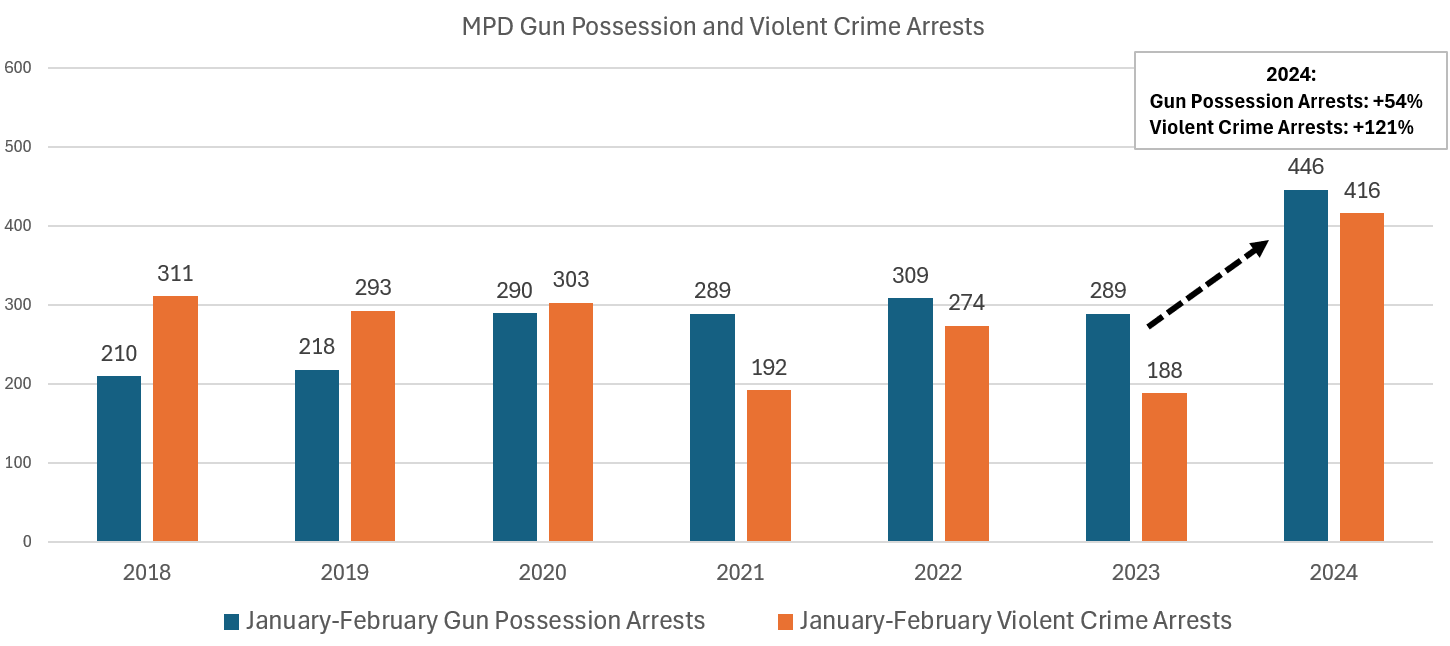

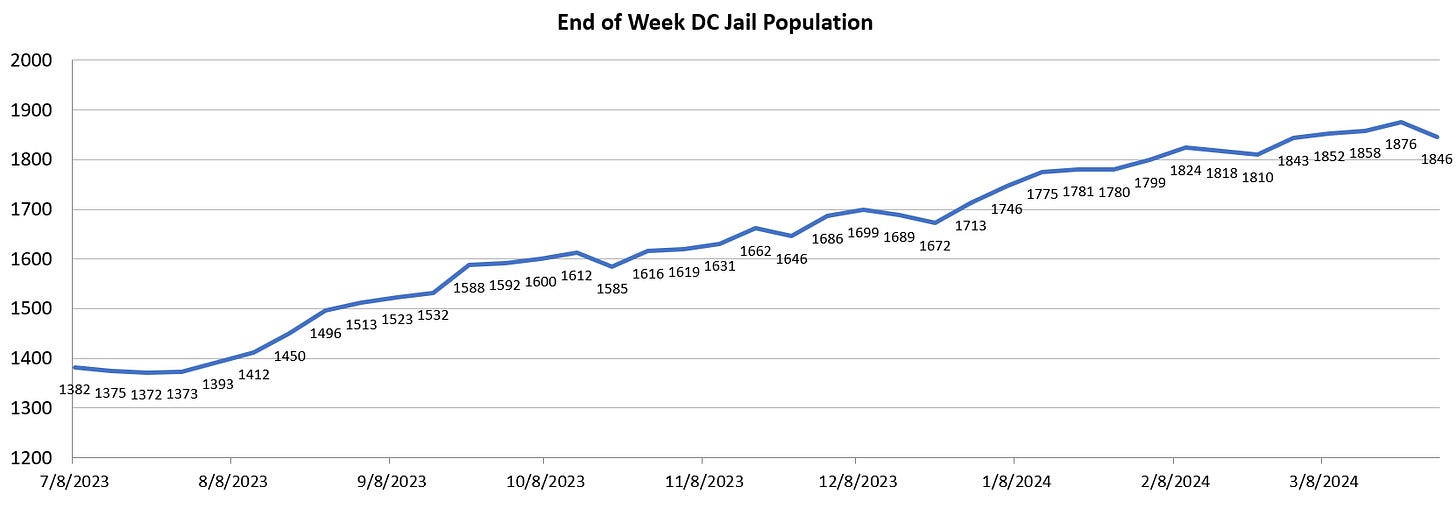
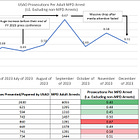
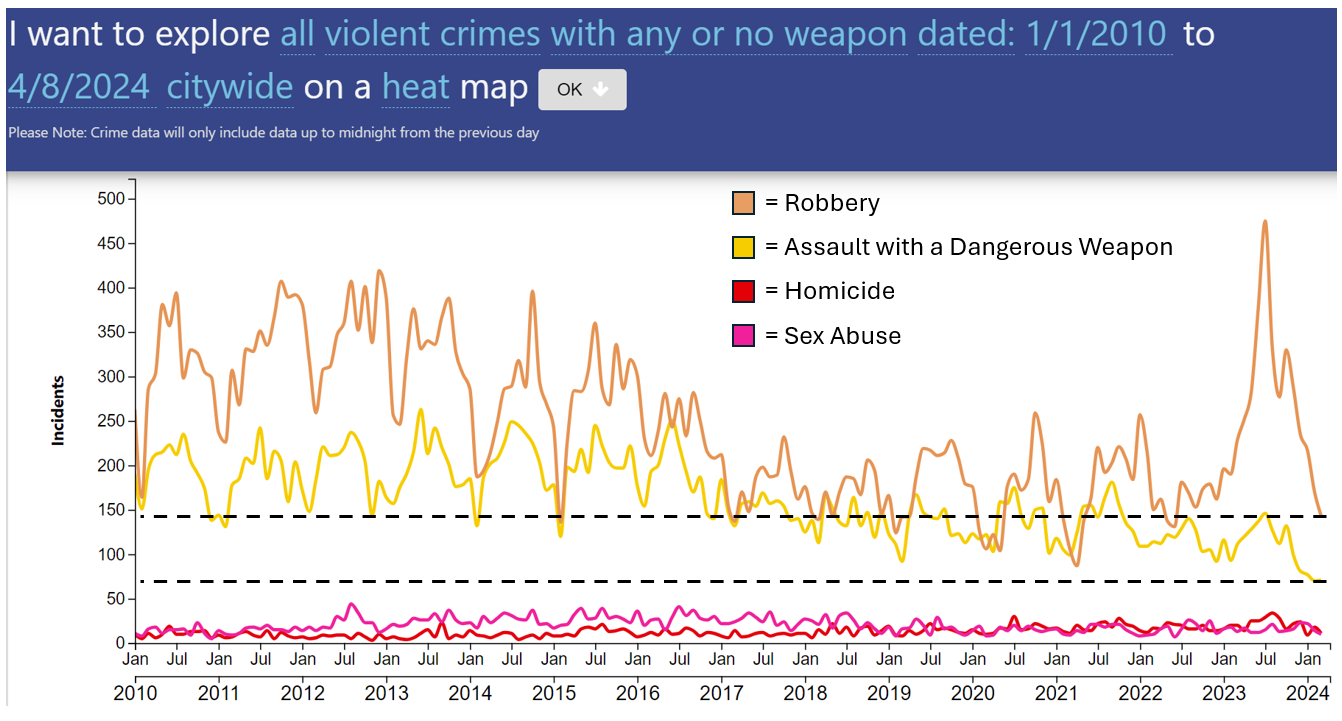

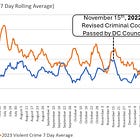



This is fantastic analysis and it's nice to read good news for a change.
One interesting thing I noted is that the number of additional people in detention (~500 or so) is about the same as the number of serious crimes reported each month. So given how concentrated crime is, I would guess the incapacitation of an extra 500 or so likely-criminals might be enough to make a real dent in crime all by itself, even without the extra benefits of deterrence.
Somewhat off-topic - but is anyone aware of good economic analysis on crime? The last time there was a shooting in my area, I started thinking about all the extra economic costs the area had to bear: Extra pay for police, EMTs, courtrooms, the expense of housing an inmate, the hospital bills for the victim, loss of labor from both the shooter and victim, shops in the area closing for the day and traffic rerouted, potential disinvestment and mental health costs, etc etc etc.
It seems like it would add up to a lot. So I was wondering if crime waves can directly cause economic stagnation or even collapse and crime reduction the opposite. It would be interesting to see the actual costs of a single shooting once it's all added up.
This is a good read. The importance of leadership and prosecutor’s office really matters. People respond to incentives. I have been saying that failure to punish bad actions creates a sense of impunity and thus more bad actions for a while. We see this with school discipline, corruption, and petty crime.
Funny thing is I also witnessed an arrest at a CVS for shoplifting last week.